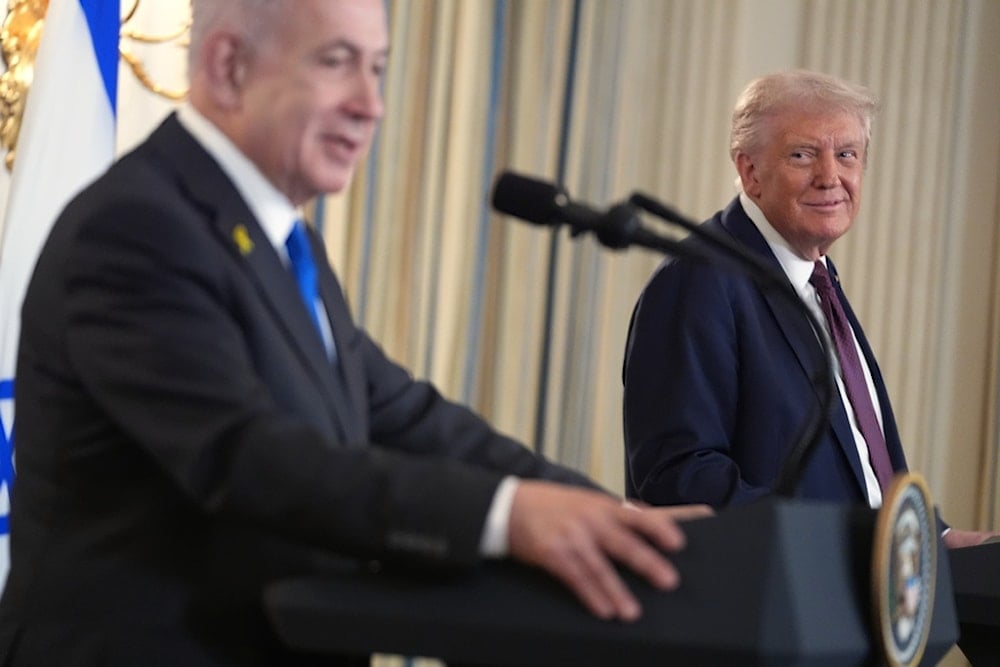How Trump cornered Netanyahu into Gaza ceasefire plan: FT
The Financial Times revealed that Donald Trump pressured Benjamin Netanyahu to accept a Gaza ceasefire plan backed by Arab states that includes a "credible pathway" to a Palestinian state.
-

US President Donald Trump listens during a news conference with Israeli Prime Minister Benjamin Netanyahu in the State Dining Room of the White House, Monday, Sept. 29, 2025, in Washington. (AP)
The Financial Times reported on Monday that US President Donald Trump put unprecedented pressure on Israeli Prime Minister Benjamin Netanyahu to accept a ceasefire deal in Gaza that includes, for the first time under a Trump-backed initiative, a "credible pathway" toward a future Palestinian state, a condition that Netanyahu had long vowed to reject.
According to the Financial Times report by Mehul Srivastava, Andrew England, and Abigail Hauslohner, Trump's proposed 20-point "peace" plan emerged from intense behind-the-scenes lobbying by Qatar, Saudi Arabia, and other Arab states, which sought to leverage the president's frustration over "Israel's" September 9 strike on Hamas negotiators in Doha. The incident, described by one former US official as a humiliation for Trump, became a turning point that allowed him to dictate the terms of a new regional agreement.
Final betrayal
Two weeks before his visit to Washington, Netanyahu had publicly declared in a West Bank settlement that "there will be no Palestinian state." But when he arrived in New York to review Trump's draft, he found language committing the US to a "credible pathway" to statehood, a move described by one Israeli official as "the final betrayal."
Sources briefed on the talks told Financial Times that Trump's priority was to end the Gaza war before the second anniversary of the October 7 operation, secure the release of 48 Israeli captives, and revive his long-standing ambition to broker normalization between "Israel" and Saudi Arabia.
When Netanyahu arrived at the White House on September 29, Trump reportedly handed him a phone receiver and made him apologize directly to Qatar's prime minister over the strike on Doha, a moment described by insiders as symbolic of the shifting balance of power between the two leaders.
Conditional peace
The document drafted by Trump's team and vetted by Arab intermediaries imposes strict conditions on "Israel's" postwar actions: it bars occupation or annexation of Gaza, forbids settlement construction, and allows the UN to resume humanitarian operations in the enclave. It also rules out forced displacement, grants Gazans the right to return, and offers conditional amnesty to Hamas fighters who disarm and renounce violence.
Although the agreement allows Netanyahu to claim limited gains, such as the exclusion of Hamas from any future Palestinian government and the disarmament of militant factions, many of its clauses run counter to the ideology of his far-right coalition. Israeli officials told the Financial Times that attempts to remove or weaken key provisions were firmly rejected by Trump's team, which warned them "to stop looking for loopholes."
The plan also establishes an international supervisory body chaired by Trump, alongside a committee of Palestinian technocrats to administer Gaza, while an international force would maintain security. In a public statement unveiling the proposal, Trump warned that if Hamas refused the offer, "Israel would have my full backing to finish the job."
Trump commands Netanyahu
Netanyahu, who had previously outmaneuvered three US presidents, appeared visibly subdued during the announcement. Observers noted that Trump's transactional diplomacy and assertive control over the process have left the Israeli leader with little room for defiance. As former Israeli ambassador Michael Oren put it, "With Donald Trump, when he says don't, then you don't."
Following the plan's release, Hamas signaled partial acceptance by agreeing to release all captives within 72 hours, a move that prompted Trump to order an immediate ceasefire while negotiations continued. When Netanyahu tried to argue that Hamas's response was a stalling tactic, Trump reportedly snapped: "Why are you so fucking negative?"
By the end of the week, Trump had publicly reinforced his stance, telling Israeli media: "He's got to be fine with it. He has no choice. With me, you got to be fine."
The Financial Times report paints a striking picture of Netanyahu's weakened position under Trump's watch, one in which US strategic ambition and Arab mediation have forced "Israel's" leader to accept terms he once deemed unthinkable, all as Trump eyes a diplomatic triumph that could secure him the Nobel Peace Prize.
Read more: Trump warns Hamas of 'complete obliteration' unless it cedes power

 4 Min Read
4 Min Read










